Understanding CBD and Its Potential Role in Autism Treatment
CBD oil, derived from the cannabis plant, has garnered attention for its potential to alleviate various autism spectrum disorder (ASD) symptoms. As families, caregivers, and medical professionals seek alternative or complementary options, scientific research and anecdotal reports highlight both possibilities and uncertainties surrounding CBD’s use in autism. This article aims to provide a comprehensive overview of current knowledge, safety considerations, and ongoing studies related to CBD oil for autism.
CBD Strains and Formulations Recommended for Autism

Are there specific CBD strains or formulations recommended for autism symptoms?
When considering CBD as part of managing autism symptoms, certain strains and formulations are often suggested for their potential benefits. High-CBD strains like Charlotte's Web are popular because they contain minimal THC—less than 0.3%—making them non-intoxicating and suitable for children and sensitive individuals. These strains are typically used to help reduce seizure activity, anxiety, and behavioral issues.
In addition to Charlotte’s Web, strains such as Lavender and Suzy Q are known for their calming and pain-relieving properties. They can promote relaxation, which might help with anxiety and agitation in autistic individuals.
For sleep-related problems, strains like Northern Lights and OG Kush are frequently recommended. They are believed to aid in improving sleep quality, mood stability, and appetite regulation.
Beyond traditional strains, cannabis-derived compounds like CBDV (cannabidivarin) and natural terpenes such as borneol are being actively researched for their therapeutic potential. These compounds may influence brain activity and immune response in ways that could support autism management.
It is critical to understand that individual responses to different CBD strains or formulations can vary significantly. Therefore, consulting with a healthcare professional or a specialist experienced in cannabinoid therapies is essential. They can help determine the most suitable product and dosage, monitor effects, and ensure safety.
In summary, while several strains and compounds show promise, personal experimentation should always be guided by medical advice to optimize benefits and decrease risks.
Mechanisms by Which CBD Affects Autism Symptoms
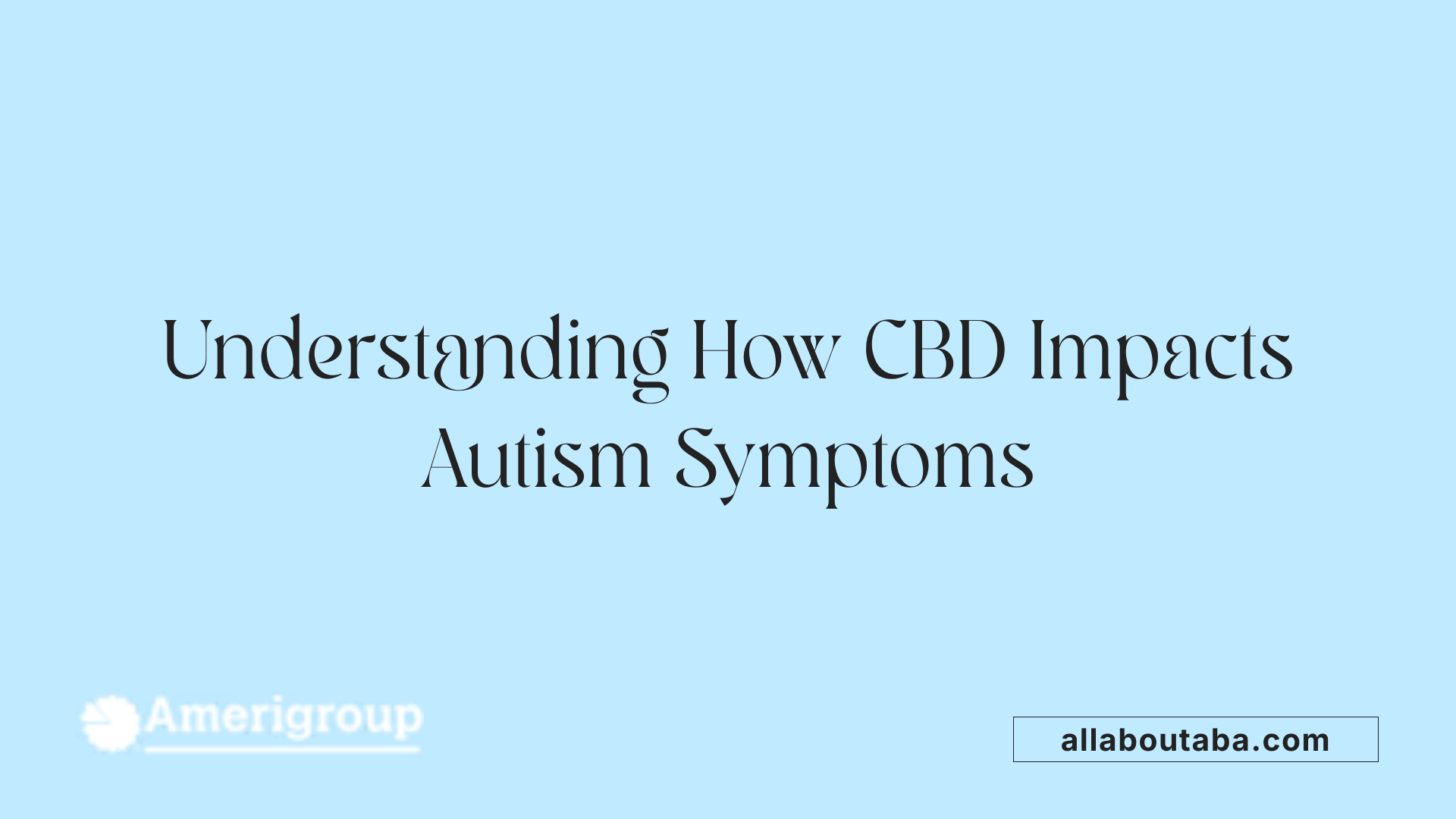 CBD influences autism-related behaviors through several complex biological pathways that affect brain chemistry and neural activity.
CBD influences autism-related behaviors through several complex biological pathways that affect brain chemistry and neural activity.
One primary way CBD helps manage symptoms like anxiety, sleep disturbances, and sensory overload is by increasing the levels of the body's own endocannabinoids, such as anandamide. By inhibiting the enzyme FAAH, which breaks down anandamide, CBD allows this neurotransmitter to stay active longer, helping to regulate mood, reduce anxiety, and improve social interactions.
CBD also interacts with key neurotransmitter systems. It activates serotonin 5-HT1A receptors, which are known to produce calming and anxiolytic effects. This action can help decrease feelings of anxiety and agitation common in individuals with ASD. In addition, CBD modulates GABA and glutamate transmission, enhancing nerve signaling stability and reducing hyperexcitability that can lead to sensory overload and aggressive behaviors.
Furthermore, CBD acts on TRPV1 receptors, involved in pain and temperature regulation, and antagonizes GPR55, which is associated with inflammation and cell proliferation. These interactions contribute to a calming effect, diminishing hyperactivity and irritability.
Research suggests that through these pathways, CBD exhibits neuroprotective, anxiolytic, and antipsychotic properties. These mechanisms can help reduce behavioral challenges, improve emotional regulation, and support better social functioning, ultimately enhancing the quality of life for many individuals with autism spectrum disorder.
Potential Benefits and Risks of CBD for Autism
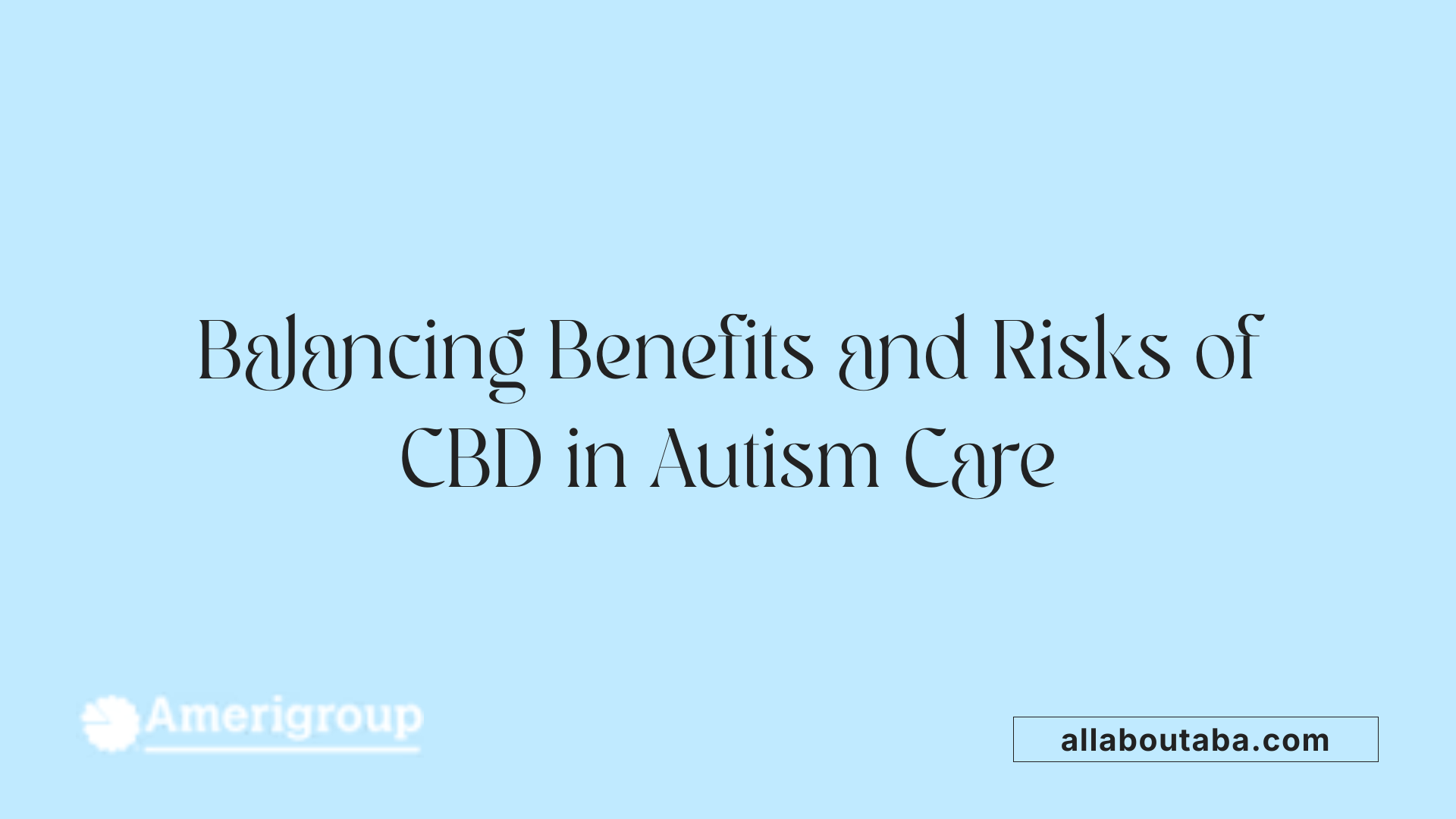
What are the potential benefits and risks of using CBD oil to manage autism symptoms?
Many families exploring CBD report positive experiences, noting that it can help reduce stress, aggression, and self-injurious behaviors. Some parents also observe improvements in sleep and emotional regulation in autistic children. Early small-scale studies and observational reports suggest that CBD may support social interactions and possibly enhance cognition. It interacts with the body's endocannabinoid system, possibly modulating neurotransmitters like GABA and glutamate, which are involved in autism.
CBD is derived from hemp, containing less than 0.3% THC, making it non-intoxicating and legally accessible in many states when sourced properly. Many caregivers use CBD oils, including oral drops and topical applications, often with doses determined through trial and error alongside medical advice.
However, it is important to recognize the limitations of current research. Most evidence comes from small studies, case reports, and surveys. Rigorous clinical trials are still needed to confirm CBD’s efficacy, establish safe and effective dosages, and understand long-term effects, especially in children.
Regarding risks, CBD may cause side effects such as nausea, drowsiness, dry mouth, low blood pressure, and behavioral changes like irritability. It can also interact with other medications, potentially affecting their metabolism. Moreover, the lack of regulation means some products may be mislabeled, contaminated, or inconsistent in CBD content.
While preliminary data are promising, the American Academy of Child and Adolescent Psychiatry warns against using CBD for autism-related behavioral issues due to insufficient evidence. Consulting healthcare professionals is crucial to ensure safe use, proper dosing, and product quality.
Ultimately, CBD is not a cure for autism but may serve as a supportive complement in managing certain symptoms. More large-scale, controlled studies are essential to fully understand its benefits and risks in this context.
Epidiolex and Its Role in Autism Treatment
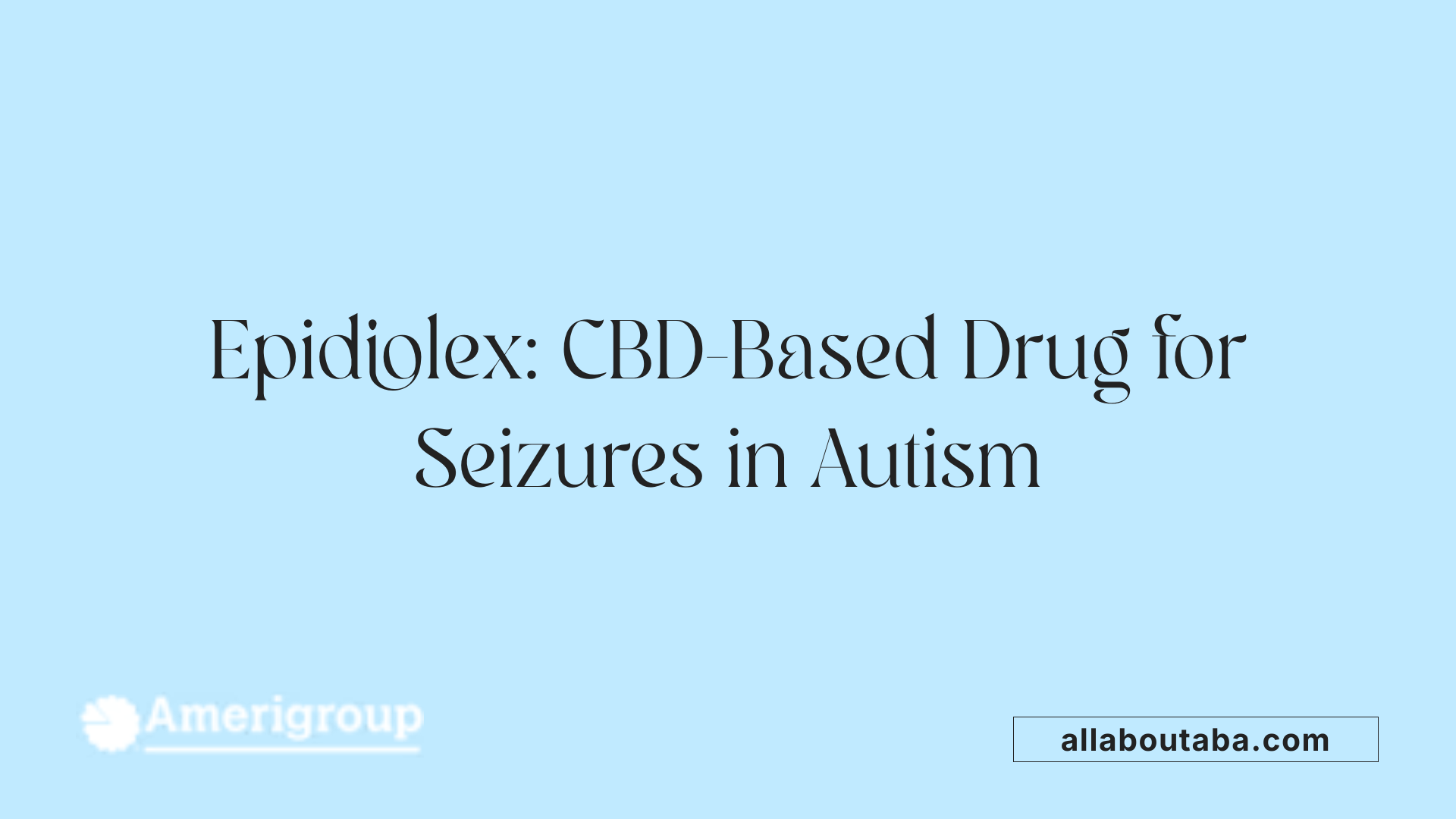
Is Epidiolex, a CBD-based pharmaceutical, approved or used for autism treatment?
Epidiolex, a medication derived from cannabidiol (CBD), has received approval from the Food and Drug Administration (FDA) specifically for the treatment of certain severe pediatric epileptic syndromes, such as Lennox-Gastaut syndrome and Dravet syndrome. However, it is not officially approved for autism spectrum disorder (ASD).
Despite this, some clinical trials and observational studies have examined the potential benefits of Epidiolex in managing behavioral symptoms commonly associated with autism. These include reductions in aggression, hyperactivity, irritability, and anxiety. For instance, preliminary research conducted by institutions like UC San Diego suggests that some children with ASD may experience notable improvements in behavior when treated with CBD-based formulations.
Several small-scale studies and open-label trials have reported that Epidiolex appears to be generally safe and well tolerated in children with ASD, with some showing positive effects on social interactions and emotional regulation. Nonetheless, these findings are preliminary, and the research is still evolving.
It is important to note that while these early results provide hope, Epidiolex is not yet considered a standard or officially sanctioned treatment for autism. Ongoing investigations are focusing on determining the optimal dosing, long-term safety, and comprehensive efficacy for autism-related symptoms.
In summary, although Epidiolex is primarily approved for specific epileptic conditions, its potential to support behavioral improvements in ASD is under active scientific exploration. Clinicians and families should consult healthcare professionals for guidance, as more rigorous and large-scale studies are necessary to establish its role in autism therapy.
Current Scientific Understanding of CBD for Autism
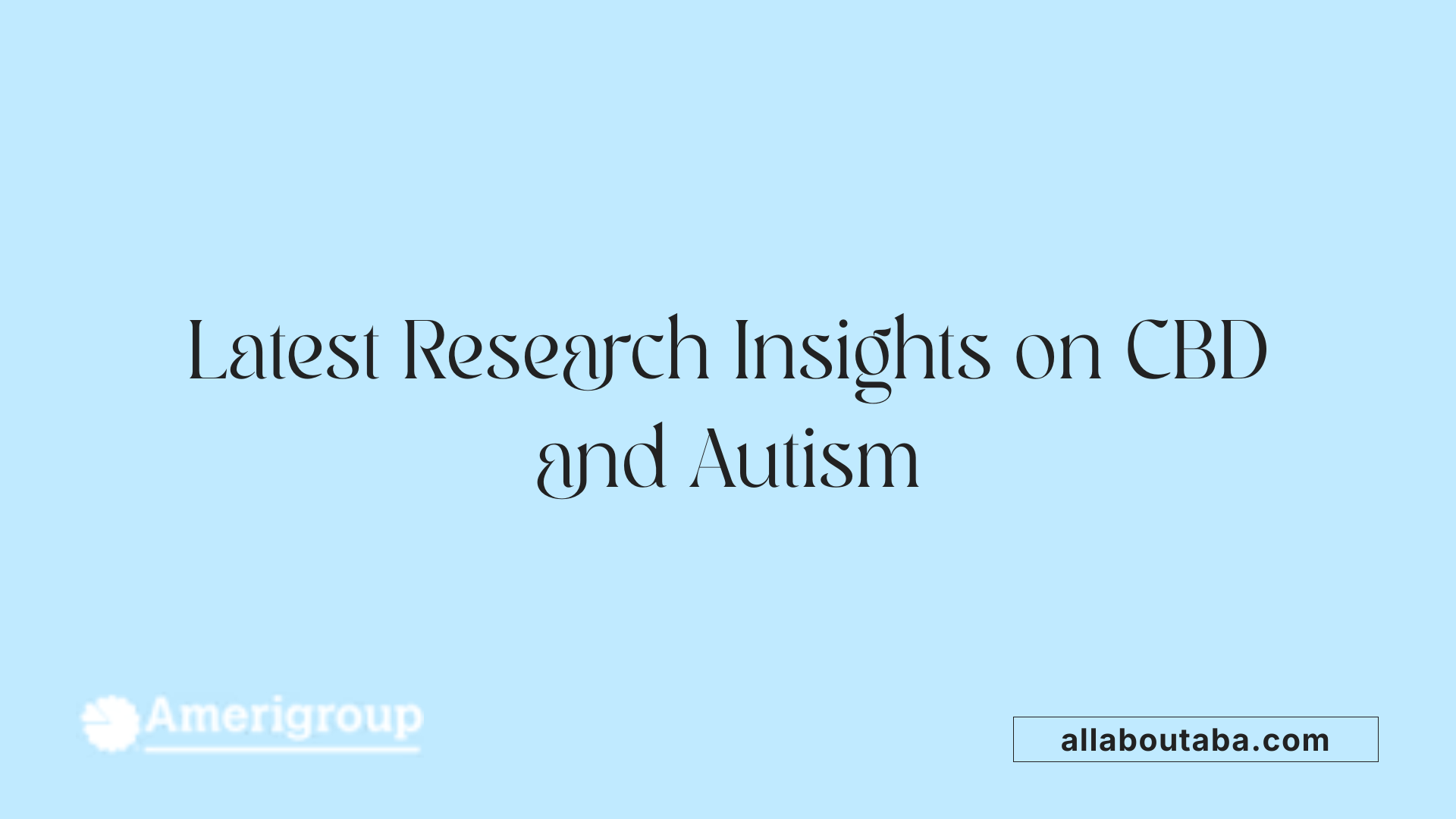
What is the current scientific understanding of CBD oil for autism treatment?
Research into CBD as a treatment for autism spectrum disorder (ASD) has yielded cautious optimism. Several small-scale studies and reviews suggest that CBD-rich formulations may provide modest improvements in sleep, social skills, behavior, and anxiety reduction in some autistic individuals.
Some evidence indicates that cannabinoids might be more effective than placebo in alleviating certain core ASD symptoms. For example, improvements in social interactions and a decrease in aggressive or disruptive behaviors have been observed in small clinical trials.
The overall safety profile of CBD appears favorable, with most adverse effects being mild and comparable to those seen in other studies involving children. These include side effects like nausea, fatigue, or sleep disturbances, but serious adverse events are rare.
However, current data rely heavily on limited, small studies, case reports, and systematic reviews that emphasize the need for larger, well-controlled clinical trials. The existing research does not yet definitively establish CBD as a standard treatment for ASD, but it provides enough evidence to justify further exploration.
In summary, while the preliminary findings are promising, the scientific community agrees that more robust research is essential to confirm effectiveness, determine optimal dosages, and understand long-term safety. At present, CBD could be considered a supportive option under medical supervision, but it is not an officially approved or widely recommended treatment for autism.
Safety Considerations When Using CBD for Autism
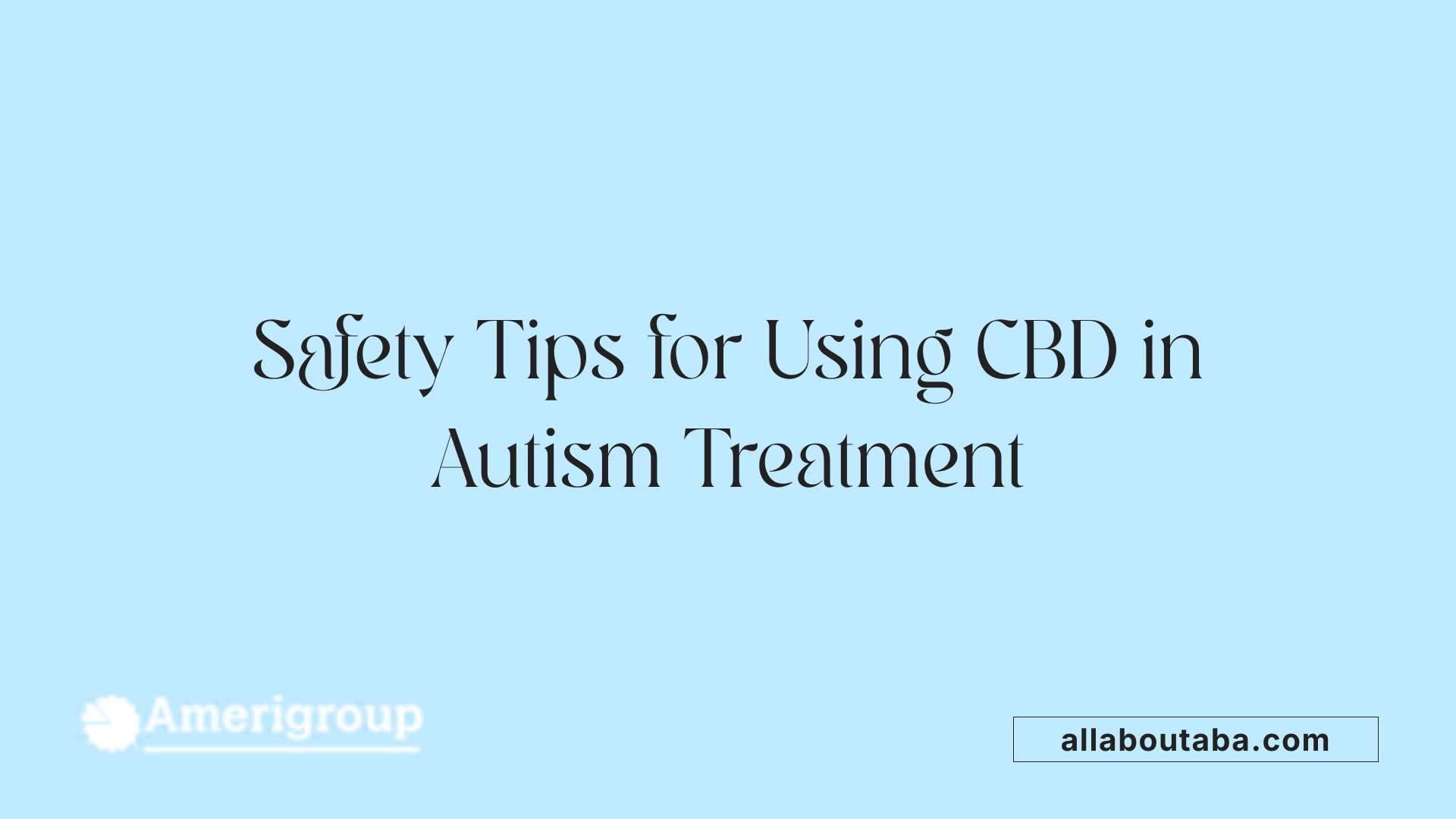
What safety considerations should be taken into account when using CBD for autism?
When considering CBD as a treatment option for children with autism, several safety aspects should be carefully evaluated. First, potential drug interactions are a concern, as CBD can influence liver enzymes that metabolize other medications, potentially altering their efficacy or increasing side effects. It’s crucial to consult with a healthcare professional familiar with CBD use to determine if it’s appropriate and to help manage any interactions.
High-quality, regulated products are vital because the CBD market is not uniformly controlled. Many products may be mislabeled or contaminated, so parents should seek CBD oils that are derived from hemp, contain little to no THC, and are produced following safety standards. Laboratory testing certificates are recommended to verify purity and potency.
Monitoring for side effects is also important. Common reactions include nausea, drowsiness, changes in blood pressure, dry mouth, and behavioral changes. Regular observation allows caregivers and clinicians to intervene early if adverse effects emerge.
Long-term safety data on CBD use in children and adolescents are still limited. While current studies suggest that CBD is generally safe at low doses, ongoing research is necessary to understand long-term impacts fully.
Lastly, legal considerations are important. CBD products must comply with local laws and regulations. In the U.S., hemp-derived CBD with less than 0.3% THC is legal in most states, but laws can vary. Ensuring legal compliance helps avoid legal risks and ensures access to safe, regulated treatments.
The Role of Cannabigerol (CBG) and Other Cannabinoids in Autism
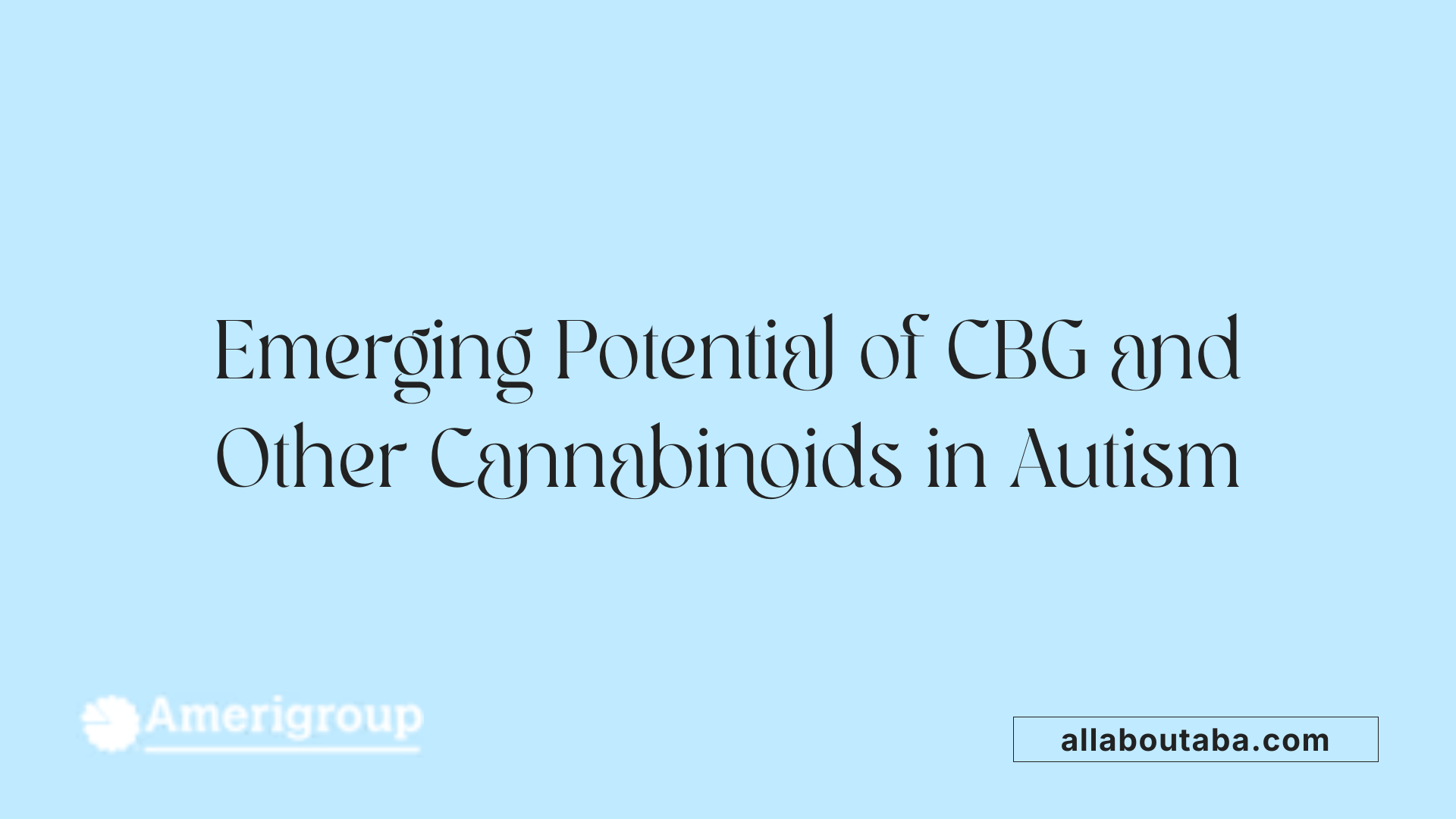
What is CBG and its relevance to autism?
Cannabigerol (CBG) is a lesser-known, non-psychoactive compound found in the cannabis plant. Unlike THC, CBG does not produce intoxication, making it an attractive candidate for research into therapeutic applications. While most research has historically focused on CBD, recent studies suggest that CBG might have significant potential, especially concerning neurological health.
CBG appears to interact with the endocannabinoid system, which regulates mood, sleep, immune response, and neuronal signaling. These functions are often disrupted in individuals with autism spectrum disorder (ASD). Researchers are investigating whether CBG can influence brain pathways associated with hyperactivity, anxiety, and social challenges commonly seen in ASD.
Research on CBG's potential neuroprotective and anti-inflammatory effects
Preliminary studies indicate that CBG may have neuroprotective qualities, helping to safeguard brain cells from damage. Its anti-inflammatory properties could also be beneficial, as neuroinflammation is believed to play a role in autism's development and symptom severity.
In laboratory settings, CBG has demonstrated the ability to reduce neuroinflammation and modulate neurotransmitter activity associated with emotional regulation. These findings are promising because they align with the therapeutic goals of reducing anxiety, aggression, and sensory sensitivities in autistic individuals.
Recent studies suggesting CBG's influence on neuroinflammation and emotional regulation in ASD
Emerging research points toward CBG’s influence on neuroimmune responses, which might help in alleviating some behavioral issues linked to autism. Small animal studies have shown that CBG can attenuate neuroinflammatory markers and improve emotional stability.
Furthermore, some reports suggest that cannabinoids like CBG could support social interaction and communication skills by altering receptor activity involved in mood regulation. These early findings highlight the potential for CBG to complement existing treatments for ASD.
Limited current evidence and need for more research
Despite the encouraging early results, there is still a paucity of rigorous scientific evidence to confirm CBG’s safety and effectiveness for autism. Most studies are preclinical or small-scale, and large, controlled clinical trials are necessary to establish proper dosing, long-term safety, and real-world efficacy.
Currently, CBG remains a promising but experimental option. Researchers emphasize that further investigation is essential to unlock its full therapeutic potential and to understand any possible side effects or interactions.
Comparison with CBD and other cannabinoids for autism management
CBD remains the most studied cannabinoid for ASD, with some evidence supporting its benefits in reducing anxiety, aggression, and sleep disturbances. In comparison, CBG has generated interest due to its distinct neuroprotective and anti-inflammatory properties, which could target different aspects of ASD symptomology.
While both cannabinoids modulate the endocannabinoid system, they may do so via different receptors and pathways. Future research might clarify whether CBG offers unique benefits or synergistic effects when combined with CBD or other compounds.
| Cannabinoid | Main Effects | Relevance to Autism | Current Research Stage |
|---|---|---|---|
| CBD | Anxiety relief, seizure control, behavior modulation | Moderate | Well-studied in clinical trials |
| CBG | Neuroprotection, anti-inflammatory, neuron modulation | Promising but preliminary | Early-stage, preclinical focus |
| THC | Psychoactive effects, mood regulation | Limited in children, caution advised | Mainly in adult studies |
As research continues, insights into cannabinoids like CBG could open new avenues for managing autism symptoms more effectively and safely.
Current Perspectives and Future Directions in CBD and Autism
While the evolving landscape of cannabidiol research offers hope for managing some autism spectrum disorder symptoms, it is crucial to approach CBD use with caution, guided by medical advice and evidence-based practices. Ongoing studies and clinical trials continue to explore its efficacy, safety, and optimal conditions of use. As regulatory frameworks develop and more high-quality trials are conducted, a clearer understanding of CBD’s therapeutic potential will emerge. For now, CBD should complement, not replace, established treatments, and should always be used under professional supervision to ensure safety and efficacy.
References
- CBD and Autism: Exploring the Benefits, Risks, and Research
- Cannabidiol in Treatment of Autism Spectrum Disorder: A Case Study
- What Parents Need to Know About CBD Oil for Autism
- Is there research on the use of cannabis products with children with ...
- Cannabidiol for Children with Autism and ADHD Study
- CBD Might Help Children with Autism, but More Research Needed
- Cannabis and cannabinoid use in autism spectrum disorder
- Cannabis & CBD fact sheet - Thinking Autism
- Children and adolescents with ASD treated with CBD-rich cannabis ...
- CBD Oil for Autism: Can It Help? - Healthline







